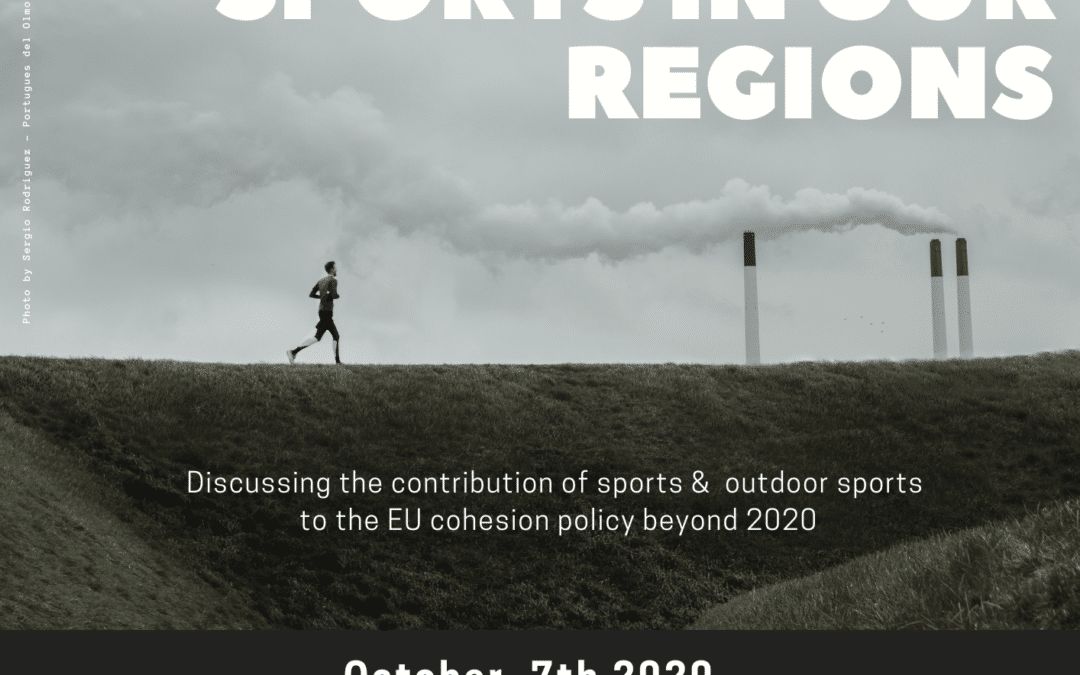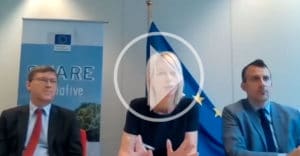A virtual workshop was held on Oct 7th within the framework of the European Week of Regions and Cities. The event has been jointly hosted by ENOS and the Directorate General for Education, Youth, Sport and Culture, European Commission, Sports Unit Belgium with the support of the European Committee of the Regions (CoR).
Background of the event
As the multiannual financial framework is currently renegotiated, the proposal for the 2021-2027 period sets out a clear focus on innovation, sustainability and the transition to a low-carbon economy.
As such, the majority of European Regional Development Fund (ERDF) and Cohesion Fund (CF) investments will be geared towards the first two policy objectives of Cohesion Policy: A Smarter Europe and a Greener, low-carbon Europe. Aside from the well-known benefits of sport and physical activity on health and wellbeing, sport has been emerging as an important policy area. Sport and physical activity could channel investment to address a number of EU priorities related to regional development such as: research and innovation, social cohesion and inclusion, lifelong learning and development, territorial regeneration or sustainability and climate change.
Acknowledging the contribution of sport to major policy areas
Over recent years, the cross-sectoral nature of outdoor sport and its contribution to major policy areas has gained recognition. The seminar on ‘Promoting greener sport in our regions’ aimed to raise awareness of the major contribution sport and physical activity can make to the second objective of the Cohesion Policy 2021-2027: a Greener, low-carbon Europe.
These discussions are extremely important in the context of the ongoing negotiations for the 2021-2027 Cohesion Policy, as they further support the argument for including sport in the Cohesion Funds’ draft regulations. This inclusion would contribute to shaping a European strategy around the promotion of sport as a driver for local and regional development.
Showcasing the power of outdoor sports
“Sport in its many forms, and especially those activities that use and engage people in the natural environment, are driven and managed by grass-roots activities from within communities. Harnessing the energy that sports create to engage people with nature, greener systems and policies could have significant impact as we seek to implement the Green Deal and bring about attitudinal and societal change “ – Says Mike Mc Clure, Chairman of ENOS.
The seminar highlighted best practice examples ranging from efforts to promote green innovation; Develop green and natural sport facilities and the impact of cycling and walking on transport systems to the links between encouraging a healthy and inclusive lifestyle and working for a healthy environment. The presentations were followed by a high-level panel discussion of the topic from EU and national policy-making perspectives.
The COVID-19 pandemic outbreak unprecedentedly affected the health and daily life of European citizens. In this context, the reality that sport and physical activity support citizens’ physical and mental wellbeing has become evident. – “The desire that citizens had to access natural areas following periods of lockdown for sport and physical activity were unprecedented” says Mike Mc Clure. The EU’s society must become more resilient and adopt long-term sustainable behaviours. It equally brings the opportunity to rethink sport policies from the perspective of enhancing society’s health and resilience and promote a sustainable, more inclusive economy.
Speakers
- Pedro Móia, Policy Assistant, Cabinet of European Commissioner Ferreira for Cohesion and Reforms, Belgium.
- Karl-Erik Nilsson, First Vice-President, Union of European Football Associations, Switzerland.
- Viola Von Cramon-Taubadel, Member of the European Parliament, European Parliament, Belgium.
- Kairis Ulp, Policy Officer, Sport Unit, Directorate General for Education, Youth, Sport and Culture, European Commission, Belgium.
- Antoaneta Angelova-Krasteva, Director for Innovation, International Cooperation and Sport, Directorate General for Education, Youth, Sport and Culture, European Commission, Belgium.
- Jeppe Thøgersen, Head of Culture, Leisure, and Sport unit, Silkeborg Municipality, Denmark.
- Guglielmo Di Cola, Member of Cabinet, European Commissioner Gabriel for Innovation, Research, Culture, Education and Youth, Belgium.
- Pauline Gessant, European Affairs Officer, Minister of Sport, France, France.
- Liisa Kajala, Senior Advisor, Metsähallitus, Parks & Wildlife Finland, Finland.
- Thomas Larssen Schmidt, President, International Mountain Bicycling Association Europe, Netherlands.
- Mike McClure, Chairman, European Network of Outdoor Sports, Belgium.
About the European Week of Regions and Cities
The European Week of Regions and Cities (#EURegionsWeek) is the biggest annual Brussels-based event dedicated to regional policy. It has grown to become a unique communication and networking platform, bringing together regions and cities from all over Europe, including decision makers, administrators, experts and academics over the last 18 years.
In 2019, the #EURegionsWeek reached a record high of more than 9000 participants and more than 330 sessions. These high levels of interest demonstrate the event’s relevance and potential as a platform for discussing and showcasing the development of EU cohesion policy raising the awareness of decision makers to the importance of regions and cities in EU policymaking. This year the event is for obvious reasons be turned into an online online event. Activities are held over a three week period.


